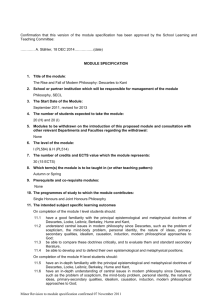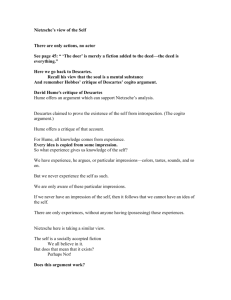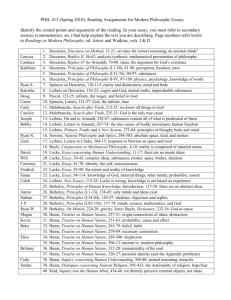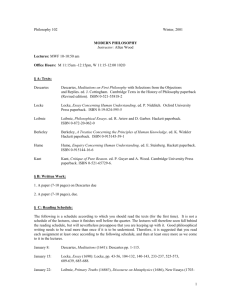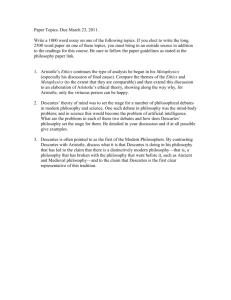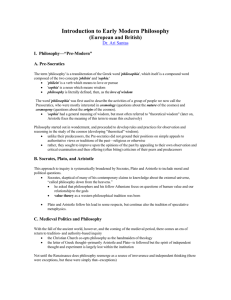Philosophy 3020: Modern Philosophy UNC Charlotte, Spring 2014
advertisement
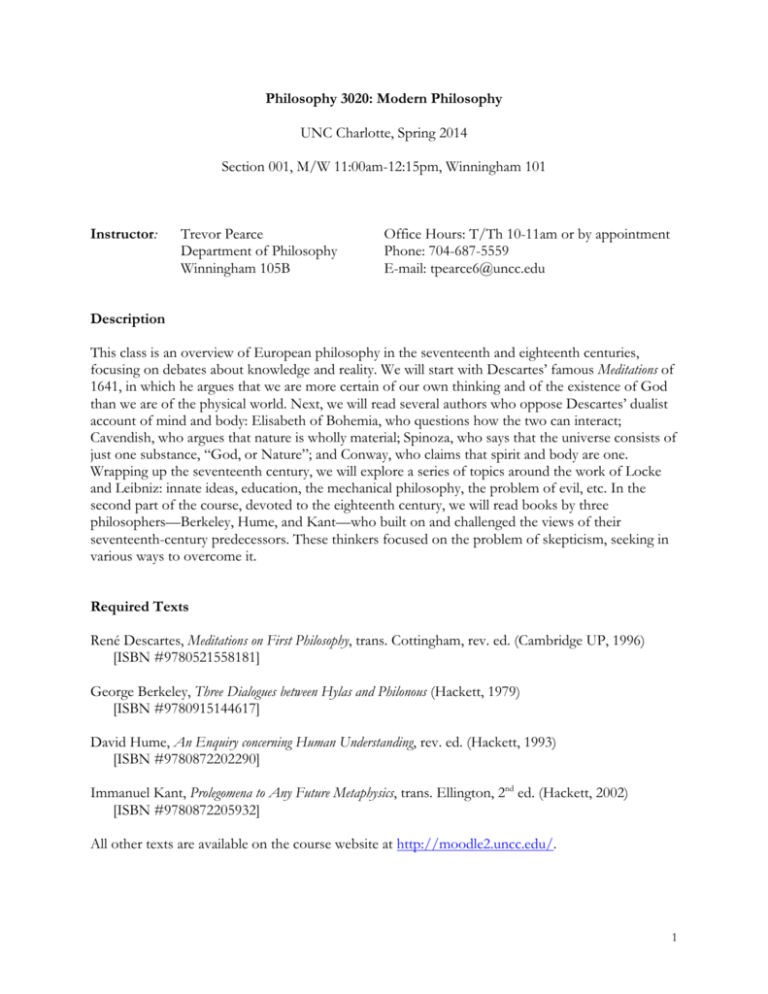
Philosophy 3020: Modern Philosophy UNC Charlotte, Spring 2014 Section 001, M/W 11:00am-12:15pm, Winningham 101 Instructor: Trevor Pearce Department of Philosophy Winningham 105B Office Hours: T/Th 10-11am or by appointment Phone: 704-687-5559 E-mail: tpearce6@uncc.edu Description This class is an overview of European philosophy in the seventeenth and eighteenth centuries, focusing on debates about knowledge and reality. We will start with Descartes’ famous Meditations of 1641, in which he argues that we are more certain of our own thinking and of the existence of God than we are of the physical world. Next, we will read several authors who oppose Descartes’ dualist account of mind and body: Elisabeth of Bohemia, who questions how the two can interact; Cavendish, who argues that nature is wholly material; Spinoza, who says that the universe consists of just one substance, “God, or Nature”; and Conway, who claims that spirit and body are one. Wrapping up the seventeenth century, we will explore a series of topics around the work of Locke and Leibniz: innate ideas, education, the mechanical philosophy, the problem of evil, etc. In the second part of the course, devoted to the eighteenth century, we will read books by three philosophers—Berkeley, Hume, and Kant—who built on and challenged the views of their seventeenth-century predecessors. These thinkers focused on the problem of skepticism, seeking in various ways to overcome it. Required Texts René Descartes, Meditations on First Philosophy, trans. Cottingham, rev. ed. (Cambridge UP, 1996) [ISBN #9780521558181] George Berkeley, Three Dialogues between Hylas and Philonous (Hackett, 1979) [ISBN #9780915144617] David Hume, An Enquiry concerning Human Understanding, rev. ed. (Hackett, 1993) [ISBN #9780872202290] Immanuel Kant, Prolegomena to Any Future Metaphysics, trans. Ellington, 2nd ed. (Hackett, 2002) [ISBN #9780872205932] All other texts are available on the course website at http://moodle2.uncc.edu/. 1 Evaluation 15% 25% 30% 30% Attendance & Participation Summaries Paper 1 (1200 ± 200 words) Paper 2 (1200 ± 200 words) Beginning January 13 February 23 May 2 ‘Participation’ means making comments and asking questions that reflect your having read and thought about the text under discussion. I will call on individual students following the small-group discussion or the summary write-up. You must bring a copy of the relevant text to each class, or you will not be able to effectively participate. For the summaries, at the beginning of each class you will spend five minutes writing a paragraph that includes (a) the main claim or thesis of the reading for that day and (b) the arguments or evidence the author gives to support this claim or thesis. You may use books and notes. I will collect and grade these summaries throughout the semester, though not every class. If you arrive late, you must still hand in your summary at the same time as everyone else. Late summaries will not be accepted. Summaries submitted via e-mail will not be accepted. Absence from class is not a valid excuse for not turning in a summary unless you receive accommodation from the Dean of Students office (see below). The lowest summary grade will be dropped. Topics for Papers 1 & 2 will be circulated by e-mail on February 10 and April 21, respectively. I am happy to provide feedback on introductions or outlines if you allow me enough time. Both must be submitted by 7pm on the due date at the Moodle 2 site via turnitin.com. Papers that are too long or too short will be penalized a minimum of half a grade point. Late papers will be penalized half a grade point per day. Class Policies The use of cell phones, smart phones, or other mobile communication devices is disruptive, and is therefore prohibited during class except in emergencies. Students are permitted to use computers during class for note-taking and other class-related work only. The standards and requirements set forth in this syllabus may be modified at any time by the course instructor. Notice of such changes will be by announcement in class or by written or e-mail notice. University Policies All students are required to read and abide by the Code of Student Academic Integrity. Violations of the Code of Student Academic Integrity, including plagiarism, will result in disciplinary action as provided in the Code. Definitions and examples of plagiarism are set forth in the Code. The Code is available from the Dean of Students Office or at http://legal.uncc.edu/policies/up-407. As a condition of taking this course, all required papers may be subject to submission for textual similarity review to Turnitin.com for the detection of plagiarism. All submitted papers will be included as source documents in the Turnitin.com reference database solely for the purpose of 2 detecting plagiarism of such papers. No student papers will be submitted to Turnitin.com without a student’s written consent and permission. If a student does not provide such written consent and permission, the instructor may: (i) require a short reflection paper on research methodology; (ii) require a draft bibliography prior to submission of the final paper; or (iii) require the cover page and first cited page of each reference source to be photocopied and submitted with the final paper. Students who miss classes, examinations or other assignments because of a religious practice or belief must provide reasonable notice of the dates of religious observances on which they will be absent by submitting a Request for Religious Accommodation Form (http://goo.gl/I1Ncv0) to the instructor prior to January 22, 2014. Students in this course seeking accommodations to disabilities must first consult with the Office of Disability Services (http://ds.uncc.edu/) and follow the instructions of that office for obtaining accommodations. Requests for excused absences due to medical emergencies, family emergencies, military orders, or court orders should be made to the Dean of Students Office (http://goo.gl/gHVrXM). Requests must be received prior to March 26, 2014 for absences prior to that date. Reading Schedule Jan. 8 – Introduction No reading PART 1: THE SEVENTEENTH CENTURY Jan. 13 – Doubt René Descartes, Meditations on First Philosophy, pp. 3-15 & 63-67 [1641] Jan. 15 – Mind Descartes, pp. 16-23 & 68-77 Jan. 22 – God Descartes, pp. 24-36 & 78-89 Jan. 27 – Truth Descartes, pp. 37-49 & 90-106 Jan. 29 – Ideas Descartes, pp. 44-49 & 95-106 Feb. 3 – Mind & Body Descartes, pp. 50-62 Elisabeth & Descartes, [Soul & Body], pp. 61-73 of The Correspondence of Princess Elisabeth… [1643] 3 Feb. 5 – Matter Margaret Cavendish, Philosophical Letters, excerpts [1664] Feb. 10 – God Baruch Spinoza, Ethics, Book 1, Definition, Axioms, and Propositions 1-16 [1660s] Feb. 12 – Mind & Body Spinoza, Book 2, Definitions, Axioms, and Propositions 1-13 Feb. 17 – Spirit Anne Conway, The Principles of the Most Ancient and Modern Philosophy, Chapters 7-9 [1670s] Feb. 19 – Innate Ideas John Locke, An Essay Concerning Human Understanding, Book 1, Chapter 2, pp. 48-65 [1690] G.W.F. Leibniz, New Essays on Human Understanding, Book 1, Chapter 1, pp. 69-88 [1704] Feb. 24 – Improvement Mary Astell, A Serious Proposal to the Ladies, Part 2, Chapter 3, Sections 1-4 [1697] Feb. 26 – Soul & Body Leibniz, “New System of the Nature of Substances” pp. 10-20 of Leibniz’s ‘New System’ [1695] Leibniz & Damaris Masham, [Correspondence], pp. 203-225 of Leibniz’s ‘New System’ [1704] PART 2: THE EIGHTEENTH CENTURY Mar. 10 – Principles & Hypotheses Émilie du Châtelet, Foundations of Physics, Chapters 1 & 4 [1740] Mar. 12 – Best of All Possible Worlds Leibniz, Theodicy, “Summary of the Controversy Reduced to Formal Arguments” [1710] Voltaire, Candide, Chapters 1-5 [1759] Mar. 17 – Scepticism George Berkeley, Three Dialogues between Hylas and Philonous, Dialogue 1 [1713] Mar. 19 – God Berkeley, Dialogue 2 Mar. 24 – Objections & Replies Berkeley, Dialogue 3 Mar. 26 – Sceptical Doubts David Hume, An Enquiry Concerning Human Understanding, Sections 4-5 [1748] Mar. 31 – Liberty & Necessity Hume, Section 8 4 Apr. 2 – [CANCELLED] Apr. 7 – Miracles Hume, Section 10 Apr. 9 – Design & Providence Hume, Section 11 Apr. 14 – NO CLASS Apr. 16 – Sceptical Philosophy Hume, Section 12 Apr. 21 – Mathematics Immanuel Kant, Prolegomena to Any Future Metaphysics, Preface, Preamble, & First Part [1783] Apr. 23 – Natural Science Kant, Second Part Apr. 28 – Metaphysics Kant, Third Part and Solution 5
